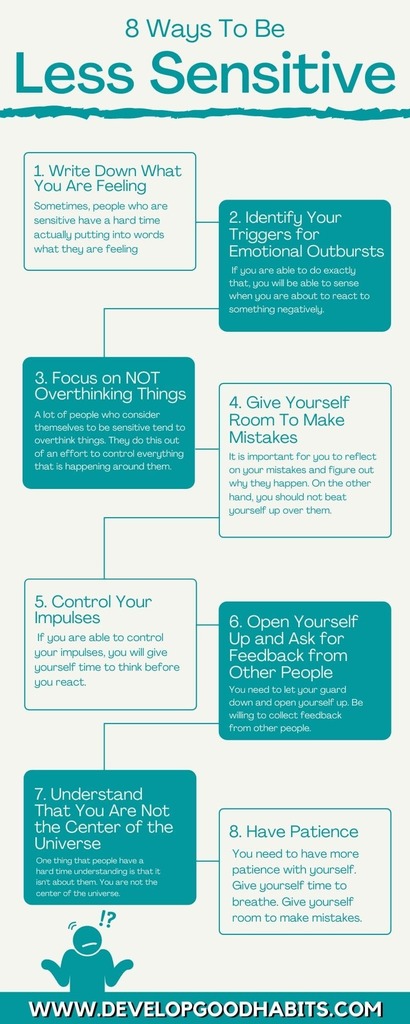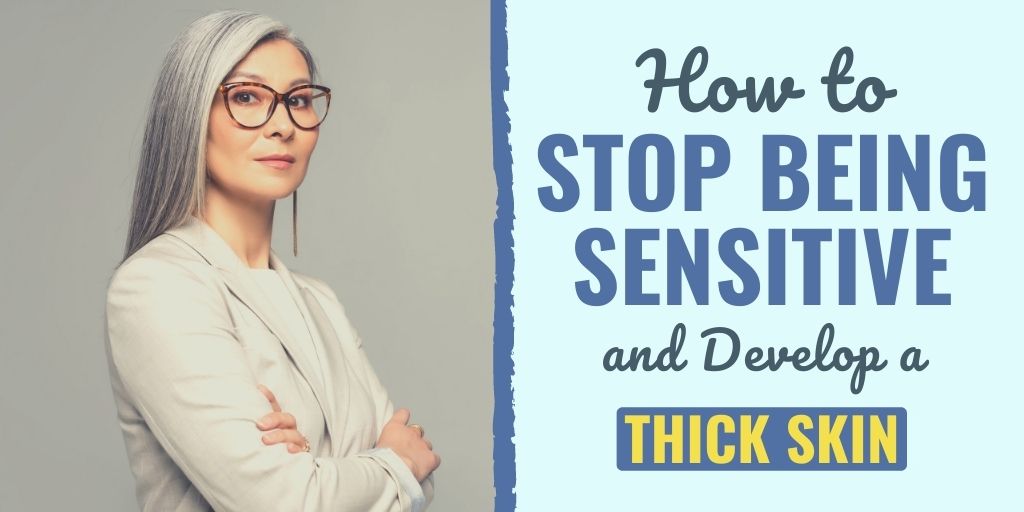A lot of people say that it is good to be sensitive. After all, if you are sensitive, you will be in close contact with your emotions and the emotions of other people.
On the other hand, if you are highly sensitive, you may let things get to you that should not bother you. Therefore, you may be looking for ways to develop a thicker skin.
What can you do to be less sensitive to adversity? In this article, I will provide strategies you can use to be less sensitive and improve your overall outlook on the world. But first, let’s answer a simple question…
What Should You Learn to Be Less Sensitive?
There are many things that you need to learn to be less sensitive; however, the biggest thing you need to remember is that you should not take everything personally. Even though you do need to pay attention to what the people around you are saying, you do not have to take everything as some criticism of you as a person. In reality, people may simply be pointing out behaviors.
Furthermore, if you can be less sensitive, you can be more confident and yourself as a person. This can provide you with the confidence you need to take the next step. Perhaps this means asking someone out on a date, applying for a job, or pursuing your life goal.
Therefore, you need to focus on ways you can be less sensitive. That way, you can spend more time focusing on what you want to do with your life.
8 Ways to Be Less Sensitive
There are several ways that you can be less sensitive. Some of the top tips that you should keep in mind include:
1. Write Down What You Are Feeling
If you are looking for a way to be less sensitive, one of the first things you should do is try to write down what you are feeling. You may be concerned that you do not have good writing skills.
The good news is that you do not have to be a strong writer to complete this task. You simply need what you are writing to make sense to you. Sometimes, sensitive people have a hard time actually putting what they are feeling into words.
As a result, they simply react negatively to what is happening around them. This can have a negative impact on other people in the area as well.
It doesn't have to be a long thread on Reddit or Twitter. It simply has to be a few words. The trick to this is to untangle what you are feeling and why you are feeling it. That way, you can figure out exactly why you are having difficulty. If you can explain to yourself why you are feeling a bit down or frustrated, you will be able to do the same thing for others.
When other people can realize why you are feeling the way you do, they will be able to help you. That way, you don't simply become a confusing ball of emotion. You will be able to vocalize exactly what you are feeling. This can place you in a good position to process your emotions later.
2. Identify Your Triggers for Emotional Outbursts
Now, if you are a sensitive person, you may not necessarily have emotional outbursts; however, you need to figure out what makes you sensitive. If you can do exactly that, you will be able to sense when you are about to react to something negatively. Then, you can get control of your emotions before it happens to you. This can have a positive impact on yourself as well as those around you.
Maybe it is difficult for you to figure out why you are becoming sensitive. At the same time, the first thing you need to do is figure out how you feel when you become sensitive. Then, look for common themes. Again, it may be helpful for you to write this down.
Does it tend to happen when someone says something mean to you? Does it tend to happen when you suddenly have to change your schedule? Does it happen when someone tells you no? If you can figure out exactly what makes you feel so sensitive, you won't be able to respond differently.
For example, you may be someone who believes someone is offending you when that is not their intention. This is one of the most common reasons why people feel sensitive. Suppose you can identify the triggers that lead to sensitive emotional outbursts.
In that case, you'll be able to avoid those situations, control your emotions, and place yourself in a better position to react to difficult situations positively.
Is it possible to shut off emotions? No. It isn't always possible and isn't always a good idea to shut off your emotions completely. Some emotions can actually help you work through your problems and improve life.
Clinical psychologist Victoria Tarratt says, “Suppressing your emotions, whether it's anger, sadness, grief, or frustrations, can lead to physical stress on your body. The effect is the same, even if the core emotion differs. We know that it can affect blood pressure, memory, and self-esteem.” This means that suppressing your emotions completely can lead to physical and psychological endangerment.
Instead of bottling up your emotions or “sucking it up,” name your emotions, talk to someone, take the time to pinpoint the cause, and really try to understand why you may be feeling what and how you are feeling.
3. Focus on NOT Overthinking Things
Many people who consider themselves sensitive people tend to overthink things, especially relationships. They do this out of an effort to control everything that is happening around them.
Lots of people like to be in control. Control gives us power. We like to be able to predict what happens next. Unfortunately, there are situations where we cannot do exactly that. As a result, we often tend to overthink things. If we overthink things, we immediately become sensitive.
You may not believe you are overthinking situations.
Instead, it may be helpful to look at a few examples. Do you tend to run the same sentence that came out of the mouth of one of your friends and your mind over and over again? Are you someone who likes to go back and read old text messages, looking for characters to show up between the lines? Do you tend to reread emails a hundred times to figure out what someone is actually trying to say?
There is a good chance that you are spending more time reading what someone wrote than the person actually took to write it. This is a sure sign that you are overthinking things. This is not healthy.

Instead of making a mountain out of a molehill, you should take everything at face value. This will get in the way of your productivity if you continue to overthink things. Yes, it is a good idea to reflect on the consequences of your actions occasionally.
On the other hand, allowing these things to continually gnaw away at you is not good for your health. It is also not good for your relationships. Try to avoid over-thinking things.
4. Give Yourself Room To Make Mistakes
People do not like to make mistakes. If you get upset at yourself when you make a mistake, you are no different from anyone else. At the same time, you also need to give yourself room to mess up from time to time.
Remember that everyone makes mistakes. You are also going to make mistakes occasionally. Yes, some mistakes are bigger than others. You need to reflect on your mistakes and figure out why they happen. On the other hand, you should not beat yourself up over them.
If you believe that your mistakes impact your well-being, you are not responding to them appropriately. Instead of trying to beat yourself up over your mistakes, you should learn from them.
What is one thing that you can do differently next time to prevent that mistake from happening? Once you figure out the answer to this question, it is time to move on. This is an important tip in helping you take care of your mental health.
If you continue to focus on your mistakes, you will negatively impact yourself and life. You should not do this to yourself. You want your outlook on life to remain positive even as you move forward after making a mistake.
Therefore, give yourself plenty of room to make mistakes. Mistakes are going to happen. It is part of being human. If you can process your mistakes in a healthy way, you will place yourself in the best position possible to be successful moving forward.
5. Control Your Impulses
You need to do everything you can to try to control your impulses. Yes, this can be difficult. After all, this is why they are called impulses in the first place. On the other hand, if you can control your impulses, you will give yourself time to think before you react.
If you tend to jump to conclusions, this could be one of the reasons you are so sensitive. If you jump to conclusions, you immediately become more defensive. If you become defensive, people think you are sensitive. As a result, you may make it hard for people to share things around you. Therefore, before you say or do anything, pause for a second.
Take a deep breath. This pause will give you time to think about the situation. Do you really think your initial reaction is correct? Is that the way you want to react in that situation?
For example, you just sent a text message to someone else. It has been five minutes, and they haven't responded yet. Clearly, they don't like you, right? They don't want to hang out with you, right? This doesn't quite sound like a logical response.
The person you texted could be busy. They could be in the shower. They could be on a plane. There are countless reasons why they might not have responded to you. Therefore, you do not need to immediately send them a follow-up text message.
Even though this may sound like a minor example, this is an example of someone letting their impulses get the best of them. If you allow this to happen, your impulses will have a negative impact on your relationship. Think before you respond to something.
6. Open Yourself Up and Ask for Feedback from Other People
Are you serious about looking for a way to become less sensitive? If that is the case, you need to let your guard down and open yourself up. Be willing to collect feedback from other people.
There are countless situations where getting feedback from other people might be helpful. For example, you may be a member of a team. If that is the case, collect feedback from your team members on things you could be doing better.
You may also want to go to your boss and ask for the same feedback. If you are a manager, you might even want to collect feedback from your employees. If you show that you will collect constructive criticism from other people, you can make yourself less sensitive.
When you collect feedback, you need to make sure you respond appropriately. Remember that people are not trying to attack you as a person when they are providing feedback. Instead, they are simply trying to target behaviors they think need to be changed. They think these behaviors need to be changed because they could make you better at whatever you are doing.
When you get feedback from other people, do not take things personally. The feedback you are receiving is about your work. It is not about who you are as a person. If you collect feedback from other people regularly, you will desensitize yourself.
7. Understand That You Are Not the Center of the Universe
One thing that people have a hard time understanding is that it isn't always about them. You are not the center of the universe. Even though you are special, everyone else is special as well. Keep in mind that not everything will be about you as a person.
This means that people may not be as invested in you as you think. Even though this can be difficult to understand, this also means that constructive criticism, not responding quickly, and not placing you at the top of their priority list is not a sign of hate. It simply means they treat you the same way as any other student, team member, colleague, or friend.

Remember that most people are too busy thinking about their own struggles and problems. As a result, if you perceive something as a negative reaction, it probably wasn't intentional. If they did something negative, they probably weren't thinking about you at all.
Do not immediately react to someone's perceived negative behavior as a slight against you. Keep this in mind, as it is one of the best ways to desensitize yourself. If you can keep this in mind, you can desensitize yourself appropriately.
8. Have Patience
Finally, always have patience if you are looking to desensitize yourself and cannot remember anything else. There are numerous situations where this is important. You need to have more patience with yourself. Give yourself time to breathe. Give yourself room to make mistakes. Understand that you will not accomplish all of your goals on the same day.
Then, you need to have patience with other people as well. Take a deep breath before you react to something. Give the other person the chance to respond. Do not assume they are simply ignoring you.
Do not take it personally if you believe someone has reacted negatively to something you did or said. There is a good chance they were not thinking about you when they said or did whatever it was that bothered you.
You also need to have patience with your family members as well. You are going to spend a lot of time with your family members. Therefore, you need to be patient with them. Understand that they are going to make mistakes as well. Just as you are not perfect, nobody else is perfect as well. As a result, you need to be patient with other people.
Patience is one of the keys to desensitizing yourself. If you give yourself time to process what has happened, you will not react out of pure emotion. This will be better not only for yourself but also for other people. If you do not remember anything else, always remember to be patient with yourself and other people. This can help you desensitize your emotions moving forward.
What Is an Example of Hypersensitivity?
If you feel heightened emotions or feel that you cannot control your emotions, it may be hypersensitivity. If you are hypersensitive, you may find yourself needing more downtime. To deal with this kind of emotional hypersensitivity, it helps to write down your feelings, figure out your triggers, not being too hard on yourself, limit your overthinking, and think before you react.
Techniques to Avoid When Trying to Become Less Sensitive
Sometimes you will find that highly sensitive people will come up with their own methods and techniques on how to become less sensitive. While some of their techniques may work in the short term, they can sometimes cause other negative feelings like those of loneliness, misunderstanding, and forgetting who you are as a person.
You shouldn't avoid social situations, shut people out, stay unemployed, develop a cold and hard exterior, or pretend to be someone you are not. Instead of these, practice mindfulness, brain training, and displacement techniques to help become less sensitive.
Other Techniques for a Sensitive Person to Try
Now that you know what to do and what not to do when trying to become less sensitive, let's dive a bit further into some more techniques that may work and can help you start to heal your emotional wounds.
Final Thoughts on How to Be Less Sensitive
Ultimately, some level of emotional sensitivity is good. After all, this kind of temperament means you will be in touch with your emotions and the emotions of people around you.
On the other hand, you should not be too sensitive and show too much of an emotional reaction, as the little things could bother you more than they should and can hurt feelings. If you can put these tips to use in your life, you may be able to be less sensitive while still remaining in contact with the emotions of yourself and others.


